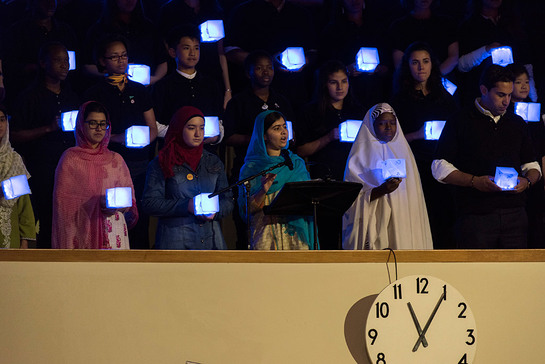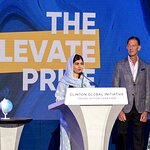Speaking at the United Nations General Assembly alongside 193 youth representatives from the Organization’s 193 Member States, Pakistani education advocate Malala Yousafzai last week asked world leaders to promise that every child will have the right to safe, free and quality primary and secondary education.

Credit/Copyright: UN Photo/Mark Garten
“World leaders sitting there, look up because the future generation is raising their voice,” Ms. Yousafzai, who was shot in 2012 by the Taliban for attending classes, told hundreds of senior government officials in a stirring address delivered from the highest mezzanine of the General Assembly Hall.
“Today, we are 193 young people representing billions more. Each lantern we hold represents the hope we have for our future because of the commitments you have made to the global goals,” she added as each young person held up a blue light.
The 17 Global Goals are part of the 2030 Agenda for Sustainable Development, which was adopted by the General Assembly just minutes after the youngest-ever Nobel Laureate addressed the Hall.
They aim to build on the work of the historic Millennium Development Goals (MDGs), which in September 2000 rallied the world around a common 15-year agenda to tackle the indignity of poverty.
“I’m hopeful that we all in the UN will be united in the goal of education and peace, and that we will make this world not just a better place, but the best place to live. Education is hope, education is peace,” Ms. Yousafzai stressed.
Meanwhile, at a press conference following the event, she was joined by four girl ambassadors from Syria, Nigeria and Pakistan who echoed her call to world leaders to ensure that every child gets 12 years of safe, free and quality education.
“The world leaders need to take all these issues more seriously,” Ms. Yousafzai told reporters. “They need to give it full attention and they should think about their own children. No one leader would want their own daughter, their own son, to be neglected of education, to be neglected in society and not given full rights.”
“It’s really tragic what’s happening to children around the world, especially in Syria, in Iraq, and how they’re suffering. It’s shocking,” she continued.
Ms. Yousafzai noted how difficult it is for her to watch the news about those conflict-torn areas because every time she does, it makes her cry that no one is taking action while children die and girls continue to be sexually abused.
“I’m hopeful that when girls like us come together and raise our voices, the voices of those girls will be listened to because we speak on their behalf, we speak for their rights.”
The advocate’s first visit to the United Nations was on 12 July, 2013, which coincided with her 16th birthday. The date is now marked internationally as Malala Day.
Source: United Nations





